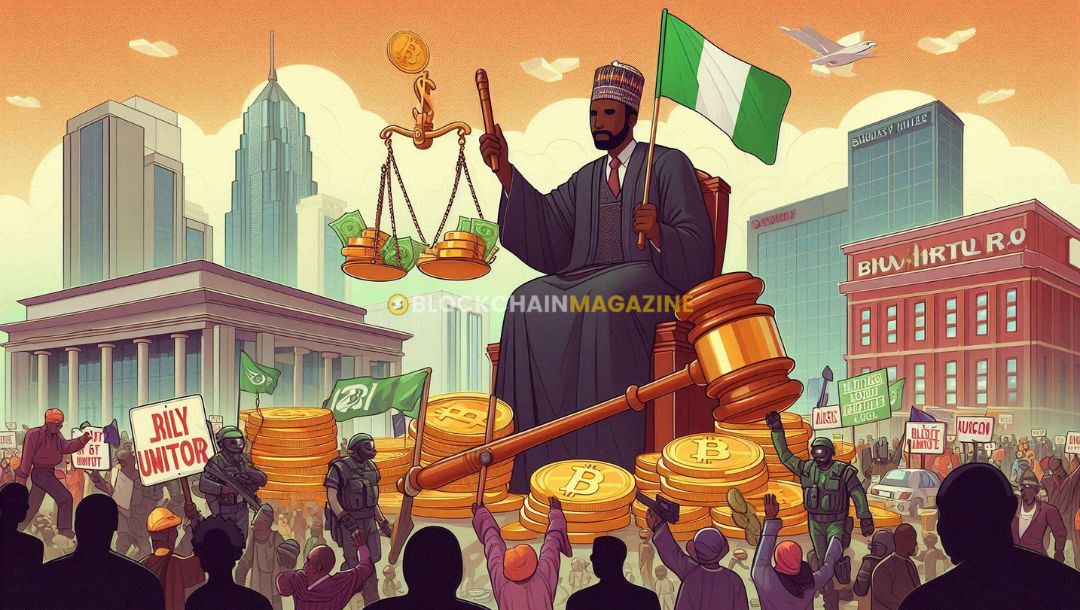Nigerian Court Freezes $38 Million in Crypto Allegedly Linked to Protests Amid Economic Turmoil
Court-Ordered Freeze of Crypto Assets
The court’s decision to immobilize four digital wallets, reportedly connected to the organizers of the #EndBadGovernance movement, was driven by a request from the Economic and Financial Crimes Commission (EFCC). The Premium Times reported on Tuesday, citing court documents, that this substantial financial blockade targets a portion of the $50 million the government claims was channeled through cryptocurrency to fuel the protests.
Government’s Justification and Response
Nuhu Ribadu, Nigeria’s National Security Adviser, disclosed in a high-level meeting involving the Council of State, convened by President Bola Tinubu, that the authorities had traced $50 million to crypto wallets. “The government successfully blocked four of those wallets containing $38 million,” Ribadu stated, as reported by Punch.
However, skepticism surrounds these claims. According to Peoples Gazette, one of the targeted crypto addresses reportedly showed a zero balance and appeared to have never been active, raising questions about the accuracy of the government’s assertions. Efforts to obtain comments from Ribadu or the EFCC were met with silence.
Also, read – CleanSpark’s Bitcoin Mining Performance in July 2024: A Tale of Strategic Accumulation and Expansion
Backdrop of Economic and Social Unrest
The freezing of these funds occurs against the backdrop of widespread public discontent in Nigeria, where citizens have been demonstrating against the relentless rise in living costs. The national currency, the naira, has been in freefall against the U.S. dollar for over a year, exacerbating inflation, which has surged to a staggering 28-year high of 33.2%. Government officials have partially attributed the naira’s depreciation to the influence of cryptocurrency trading, which they claim has disrupted the economy.
Earlier this year, Olayemi Cardoso, Governor of the Bank of Nigeria, criticized the role of crypto exchange Binance in exacerbating the country’s financial woes. Cardoso asserted that Binance facilitated the untraceable transfer of $26 billion out of Nigeria last year, undermining tax revenues and prompting government scrutiny. This scrutiny led to the controversial detention of Tigran Gambaryan, a U.S. citizen and Binance official, who had been invited to Nigeria for discussions related to the ongoing dispute.
Stay informed with daily updates from Blockchain Magazine on Google News. Click here to follow us and mark as favorite: [Blockchain Magazine on Google News].
Get Blockchain Insights In Inbox
Stay ahead of the curve with expert analysis and market updates.
latest from tech
Disclaimer: Any post shared by a third-party agency are sponsored and Blockchain Magazine has no views on any such posts. The views and opinions expressed in this post are those of the clients and do not necessarily reflect the official policy or position of Blockchain Magazine. The information provided in this post is for informational purposes only and should not be considered as financial, investment, or professional advice. Blockchain Magazine does not endorse or promote any specific products, services, or companies mentioned in this posts. Readers are encouraged to conduct their own research and consult with a qualified professional before making any financial decisions.

 Bitcoin
Bitcoin  Ethereum
Ethereum  Tether
Tether  XRP
XRP  Solana
Solana  Dogecoin
Dogecoin  USDC
USDC  Cardano
Cardano  Lido Staked Ether
Lido Staked Ether  TRON
TRON  Avalanche
Avalanche  Sui
Sui  Wrapped stETH
Wrapped stETH  Toncoin
Toncoin  Shiba Inu
Shiba Inu  Chainlink
Chainlink  Wrapped Bitcoin
Wrapped Bitcoin  Stellar
Stellar  Hedera
Hedera  Polkadot
Polkadot  WETH
WETH  LEO Token
LEO Token  Bitcoin Cash
Bitcoin Cash  Uniswap
Uniswap  Litecoin
Litecoin  Pepe
Pepe  Hyperliquid
Hyperliquid  Wrapped eETH
Wrapped eETH  NEAR Protocol
NEAR Protocol  Ethena USDe
Ethena USDe  USDS
USDS  Internet Computer
Internet Computer  Aptos
Aptos  Aave
Aave  Mantle
Mantle  Cronos
Cronos  POL (ex-MATIC)
POL (ex-MATIC)  MANTRA
MANTRA  Ethereum Classic
Ethereum Classic  Render
Render  Monero
Monero  Bittensor
Bittensor  Tokenize Xchange
Tokenize Xchange  Artificial Superintelligence Alliance
Artificial Superintelligence Alliance  Dai
Dai  Virtuals Protocol
Virtuals Protocol  Arbitrum
Arbitrum 



